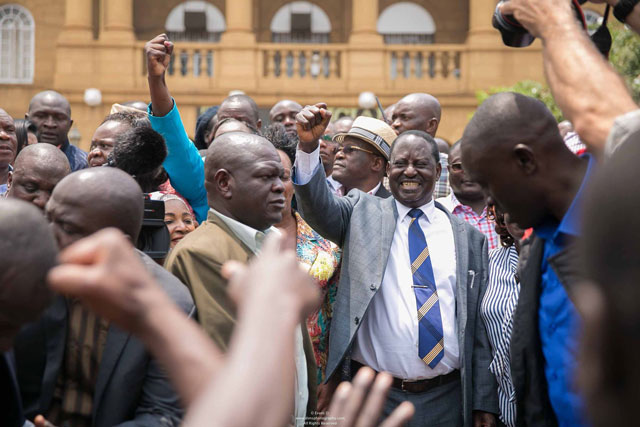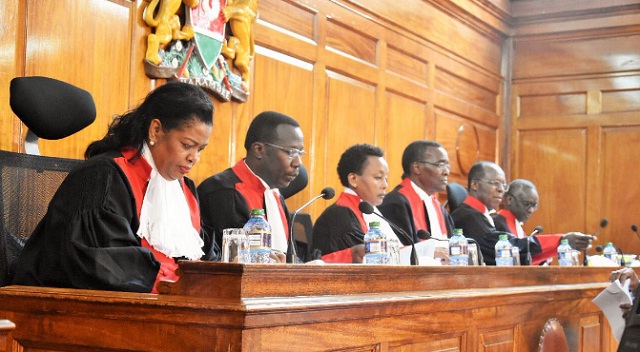
Nairobi, Kenya | AFP | A decision by Kenya’s Supreme Court to annul the results of last month’s presidential election was hailed Friday by analysts as “historic” and “an example for the rest of the world”.
However, they warned that the 60 days within which a new election must be held will bring tension and anxiety, and the restraint of leaders and credibility of the new election will be paramount.
– A ‘historic decision’ –
On Friday, Kenya’s Supreme Court rendered a shock ruling cancelling the results of the August 8 election over widespread irregularities.
Chief Justice David Maraga said a majority decision by the panel of seven judges, with two dissenting, found that President Uhuru Kenyatta “was not validly elected”, rendering the result “invalid, null and void”.
Veteran opposition leader Raila Odinga and his National Super Alliance (NASA) had taken the case to court, claiming the system transmitting votes had been hacked, and that forms from polling stations that were meant to back up the electronic results were not being uploaded.
“It is a historic decision, the first of its kind in Africa,” Murithi Mutiga, a Nairobi-based senior analyst at the International Crisis Group, said.
Mutiga said the ruling “means Kenya, one of the most open societies in Africa, is gradually maturing as a democracy”.
The “opposition can now go to court and expect to be served with justice”, he added.
According to Nic Cheeseman, a professor in African politics at the University of Birmingham, many observers expected a “conservative” ruling — similar to the decision in 2013 where Odinga took his grievances to court but eventually lost.
In a statement, Justus Nyang’aya, country director for Amnesty International Kenya, said the decision “demonstrates the independence of Kenya’s judiciary and sets an example for the rest of the world”.
But while the ruling “upholds the constitution” adopted in 2010, “it will put a lot of question marks on the international observers, who have massively said the election day went well,” an African diplomat told AFP on condition of anonymity.
– The unknown –
In the majority decision, Maraga said the election commission (IEBC) had been responsible for “irregularities and illegalities” which “affected the integrity of the election”.

But until the court’s full ruling is released, it is unclear what the judgement is based on.
“They’ve made one of the most important decisions in Kenyan history,” Cheeseman said, “and it’s going to be 21 days before we find out why”.
Analysts bemoaned the wait, adding that the court’s final statement will likely influence the next vote and the people who will be in charge of carrying it out.
“The reason why this election was not well run was because the IEBC had so little time to run it,” Cheeseman said, noting that new election commissioners were named a mere seven months before the August poll.
“And so now you have less time”.
For his part, the anonymous African diplomat said Kenya could see a rush of other dissatisfied candidates who lost out in governor, senator or MP races turn to the court with election grievances following the ruling.
– ‘Show some maturity’ –
“A lot of people will be nervous,” Cheeseman said. “Kenya just had a difficult and controversial election, and this decision pushes it right back into another electoral campaign, which will start almost immediately”.
“The outcome of the next election may be controversial again”.
This is why “the reaction of the political leaders will be extremely critical in the next two months,” Mutiga said.
“There will be anxiety, there will be uncertainty, but political leaders need to show some maturity and make sure that they don’t ruin what in my view is a remarkably important step for Kenya’s democracy”.
Mutiga added however that “restraint will be difficult in this very polarised environment” — which was also stark before, during and after the August vote due to deep ethnic, economic and political divisions in Kenya.
On Friday, Amnesty International urged “all parties to comply with the judgement,” calling “on the police to observe restraint in their handling of any celebrations or protests” that may follow.
The August 11 declaration of Kenyatta’s victory with 54.27 percent of the vote — with not all the tallying forms in — sparked two days of protests in the slums of Nairobi and Kisumu, traditional opposition strongholds.
At least 21 people, including a baby and a nine-year-old girl, were killed, mostly by police, according to an AFP tally.
 The Independent Uganda: You get the Truth we Pay the Price
The Independent Uganda: You get the Truth we Pay the Price



